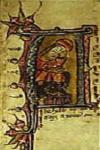In a somer sesun, whon softe was the sonn{.e},
I schop me into a shroud, as I a scheep wer{.e};
In habite as an hermite unholy of werk{.e}s
Wente I wyde in this world wondr{.e}s to her{.e};
Bote in a May{.e}s morwnynge on Malverne hull{.e}s
Me bifel a ferly, of fairie, me-thought{.e}.
I was wery, forwandr{.e}d, and went{.e} me to rest{.e}
Undur a brod banke bi a bourn{.e} sid{.e};
And as I lay and leon{.e}de and lok{.e}de on the watr{.e}s,
I slumbr{.e}de in a slepynge, hit swy{.e}d so muri{.e}.
Thenne gon I meeten a mervelous sweven,
That I was in a wilderness{.e}, wuste I never wher{.e};
And as I beheold into the est an heigh to the sonn{.e},
I sauh a tour on a toft, try{.e}lyche i-maket;
A deop dal{.e} bineoth{.e}, a dungun ther-inn{.e},
With deop dich and derk and dredful of sight{.e}.
A feir feld full of folk fond I ther bitwen{.e},
Of all{.e} maner of men, the mene and the rich{.e},
Worchinge and wandringe as the world asketh.
Summ{.e} putten hem to the plough, pleiden ful selden{.e},
In settynge and in sowyng{.e} swonken ful hard{.e},
And wonnen that theos wasturs with glotonye distruen.
And summ{.e} putten hem to pruid{.e}, apparaylden hem ther-after,
In cuntenaunce of clothing{.e} comen disgisid.
To preyer{.e}s and to penaunc{.e} putten hem mony{.e},
For love of ur Lord liv{.e}den ful streit{.e},
In hop{.e} for to hav{.e} hevene-rich{.e} bliss{.e};
As ancr{.e}s and hermyt{.e}s that holdeth hem in heor{.e} cell{.e}s,
Coveyt{.e} not in cuntré to cairen about{.e},
For non likerous lyflod{.e} heor{.e} licam to ples{.e}.
And summ{.e} chosen chaffar{.e} to cheeven the bettr{.e},
As hit semeth to ur{.e} sight{.e} that such{.e} men thryveth;
And summ{.e}, murthh{.e}s to maken as munstrals cunn{.e},
And get{.e} gold with her{.e} gle, giltles, I trow{.e}.
Bote japers and jangelers, Judas children,
Founden hem fantasy{.e}s and fool{.e}s hem maaden,
And habbeth wit at heor{.e} will{.e} to worchen yif hem lust{.e}.
That Poul precheth of hem, I dar not preoven heer{.e};
Qui loquitur turpiloquium he is Lucifer{.e}s hyn{.e}.
Bidders and beggers faste aboute eoden,
Til heor bagg{.e}s and heore balies weren bretful i-crommet;
Feyneden hem for heor{.e} food{.e}, foughten att{.e} al{.e};
In glotony{.e}, God wot, gon heo to bedd{.e},
And ryseth up with ribaudy{.e} this roberd{.e}s knav{.e}s;
Sleep and sleughth{.e} suweth hem ever{.e}.
Pilgrimes and palmers plihten hem togeder{.e}s
For to sech{.e} Seint Jam{.e} and seint{.e}s at Room{.e};
Wenten forth in heor{.e} wey with mony wys{.e} tal{.e}s,
And hedden lev{.e} to lyen al heor{.e} lyf aftir.
Ermyt{.e}s on an hep with hokid{.e} stav{.e}s,
Wenten to Walsyngham and her{.e} wenchis after;
Gret{.e} lobr{.e}s and long{.e} that loth weor{.e} to swynk{.e}
Clotheden hem in cop{.e}s to beo knowen for bretheren;
And summ{.e} schopen hem to hermyt{.e}s heore es{.e} to hav{.e}.
I fond there frer{.e}s, all the foure ordr{.e}s,
Prechinge the pepl{.e} for profyt of heor{.e} womb{.e}s,
Glosynge the Gospel as hem good liketh,
For covetyse of cop{.e}s construeth hit ill{.e};
For monye of this maistr{.e}s mowen clothen hem at lyking,
For moneye and heor{.e} marchaundi{.e} meeten togeder{.e};
Sethth{.e} Charité hath be chapmon, and cheef to schriven lord{.e}s,
Mony ferly{.e}s han bifall{.e} in a few{.e} yer{.e}s.
But Holychirche and heo hold{.e} bet togeder{.e},
The most{.e} mischeef on mold{.e} is mountyng up fast{.e}.
Ther prechede a pardoner, as he a prest wer{.e},
And brought forth a bull{.e} with bisschop{.e}s sel{.e}s,
And seid{.e} that himself might{.e} asoylen hem all{.e}
Of falsnesse and fastinge and of vouw{.e}s i-broken.
The lewed{.e} men levide him wel and lik{.e}de his spech{.e},
And comen up knelyng{.e} to kissen his bull{.e};
He bonch{.e}de hem with his brevet and bler{.e}d heore eiyen,
And raught{.e} with his rag{.e}mon ring{.e}s and broch{.e}s.
Thus ye yiveth our{.e} gold glotonis to helpen!
And leveth hit to losels that lecherie haunten.
Weor{.e} the bisschop i-blesset and worth bothe his er{.e}s,
His sel shulde not be sent to deceyv{.e} the pepl{.e}.
It is not al bi the bisschop that the boy{.e} precheth,
Bote the parisch prest and the pardoner part{.e} the selver
That the por{.e} peple of the parisch schulde have yif that heo ne weor{.e},
Person{.e}s and parisch prest{.e}s playneth to heor{.e} bisschops,
That heor{.e} parisch hath ben por{.e} sethth{.e} the pestilenc{.e} tym{.e},
To have a lycence and lev{.e} at Londun to dwell{.e},
To sing{.e} ther for simony{.e}, for selver is swet{.e}.
Ther hovide an hundret in houv{.e}s of selk{.e},
Serjauns hit semid{.e} to serven att{.e} barr{.e};
Pleden for pens and pound{.e}s the law{.e},
Not for love of ur Lord unloseth heor{.e} lipp{.e}s on{.e}s,
Thou mightest beter meten the myst on Malvern{.e} hull{.e}s
Then geten a mom of heor{.e} mouth til moneye weor{.e} schew{.e}d!
I saugh ther bisschops bold{.e} and bachilers of divyn{.e}
Bicoom{.e} clerk{.e}s of acount{.e} the king for to serven.
Erchedeken{.e}s and denis, that dignité haven
To prech{.e} the pepl{.e} and por{.e} men to feed{.e},
Beon lopen to Londun, bi leve of heor{.e} bisschop{.e}s,
To ben clerk{.e}s of the Kyng{.e}s Bench{.e} the cuntré to schend{.e}
Barouns and burgeis and bond{.e}-men also
I saugh in that semblé, as ye schul heren aftur,
Bakers, bochers, and breusters mony{.e},
Wollen{.e}-websteris, and weveris of lynen,
Taillours, tanneris, and tokkeris both{.e},
Masons, minours, and mony other craft{.e}s,
Dykers, and delvers, that don heor{.e} ded{.e}s ill{.e},
And driveth forth the long{.e} day with "Deu vous sav{.e}, Dam Emm{.e}!"
Cook{.e}s and heor{.e} knav{.e}s cryen "Hot{.e} pi{.e}s, hot{.e}!
"Good{.e} gees and grys! Go we dyn{.e}, go we!"
Taverners to hem told{.e} the sam{.e} tal{.e},
With wyn of Osey{.e} and win of Gaskoyn{.e},
Of the Ryn and of the Rochel, the rost to defy{.e},
Al this I saugh slepynge and sev{.e} sith{.e}s mor{.e}.






